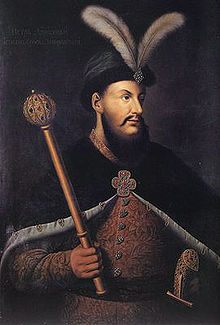This is an old revision of this page, as edited by Mew cyborg (talk | contribs) at 22:48, 5 December 2024 (→Background: Added background section text.). The present address (URL) is a permanent link to this revision, which may differ significantly from the current revision.
Revision as of 22:48, 5 December 2024 by Mew cyborg (talk | contribs) (→Background: Added background section text.)(diff) ← Previous revision | Latest revision (diff) | Newer revision → (diff)| The Right-Bank campaign of Samoilovich and Romodanovsky | |||||||
|---|---|---|---|---|---|---|---|
| Part of The Ruin (Ukrainian history) | |||||||
| |||||||
| Belligerents | |||||||
|
|
| ||||||
| Commanders and leaders | |||||||
|
|
| ||||||
The Right-Bank Campaign of 1674 were the military actions of Moscow and Ukrainian troops under the leadership of the Left-Bank Hetman Ivan Samoilovych and Grigory Romodanovsky against the forces of the Right-Bank Hetman Petro Doroshenko , aimed at spreading royal power to Right-Bank Ukraine.
Background

With the signing of the Buchach Peace Treaty of 1672 a Cossack state on the right bank of the Dnieper was recognised and Moscow sought to extend its influence there. Left-bank hetman Ivan Samoilovych was instructed to negotiate with right-bank hetman Petro Doroshenko for Moscow's protection, but he feared losing his power. Doroshenko was willing to accept Moscow's supremacy under certain conditions, including armed assistance and maintaining Cossack freedoms, but Moscow preferred having separate hetmans for each bank and refused to meet all of Doroshenko’s demands. Over time, Moscow grew frustrated with Doroshenko's insistence on ceding territory for loyalty and, by 1674, felt ready to act against him, especially as support for Doroshenko had weakened among his allies.This lead to Samoilovych, fearing that he would be replaced as hetman by Doroshenko,saw this as a good opportunity to invade Right-Bank Ukraine.
References
- Kármán 2013, p. 146.
Bibliography
- Smolii, Valery (2015). Українська державна ідея XVII — XVIII століть: проблеми формування, еволюції, реалізації [The Ukrainian state idea of the 17th-18th centuries: problems of formation, evolution, implementation] (in Ukrainian). Kyiv. ISBN 978-5-903389-99-5.
{{cite book}}: CS1 maint: location missing publisher (link) - Smolii, Valery (2003). Гетьмани і монархи. Українська держава в міжнародних відносинах 1648 - 1714 рр. [Hetmans and monarchs. The Ukrainian state in international relations 1648 - 1714] (in Ukrainian). New York. ISBN 966-02-2431-1.
{{cite book}}: CS1 maint: location missing publisher (link) - Davies, Brain (2014). Warfare, State and Society on the Black Sea Steppe, 1500-1700. Routledge. ISBN 9781134552825.
- Kármán, Gábor (2013). The European Tributary States of the Ottoman Empire in the Sixteenth and Seventeenth Centuries. Volume 53. BRILL. ISBN 9789004246065.
- Allen, William (2006). The Ukraine,A History. Cambridge university Press. ISBN 9781107641860.
- Solovyov, Sergey (1879). История России с древнейших времён [History of Russia from Ancient Times] (in Russian). ISBN 9785170960903.
- Markevych, Mykola (1843). История малой России Том пятый [History of Little Russia Volume 5] (in Russian).
- Yavornitsky, Dmytro (1897). История запорожских казаков. Том 2 [History of the Zaporozhian Cossacks. Volume 2] (in Russian). ISBN 9783963136863.
- Perrie, Maurren (2006). The Cambridge history of Russia. Volume 1: From early Rus' to 1689. Cambridge university Press. ISBN 0-521-81227-5.